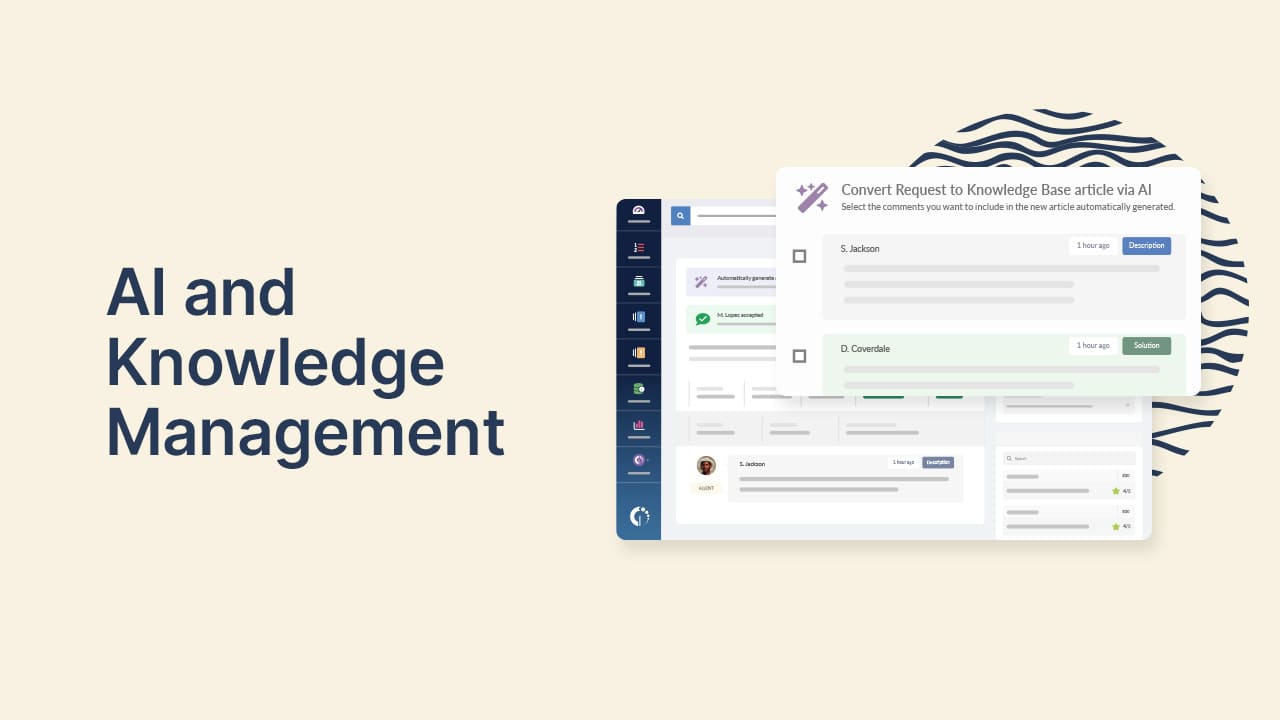The future of knowledge management (KM) is being shaped by rapidly changing technologies and evolving work environments. As businesses face increasing amounts of data and more distributed teams, the need for smart, accessible knowledge systems has never been more critical. Effective KM helps organizations avoid lost knowledge, improve decision-making, and foster collaboration across all levels.
In this article, we’ll explore how KM has developed since its early days, examine current trends like AI and digital transformation, and discuss the innovations that will define its future. We'll also look at the challenges ahead and strategies for building more adaptive, resilient knowledge systems.
Historical context of Knowledge Management
Knowledge management (KM) as a formal discipline began to take shape in the mid-1980s, though its roots trace back to the broader concept of managing information. Initially, KM centered around creating repositories where information could be stored and retrieved. Early efforts revolved around document management and databases to capture institutional knowledge. However, as businesses grew more complex and globalized, the need for more sophisticated ways to handle knowledge became evident.
One of the key milestones in KM came in the 1990s with the advent of intranets and enterprise-wide information-sharing platforms. This era brought a focus on codifying knowledge—turning tacit knowledge (knowledge that resides in people’s heads) into explicit knowledge that could be stored and accessed digitally. During this time, thought leaders like Ikujiro Nonaka and Hirotaka Takeuchi gained prominence with their work on the SECI model, one of the first Knowledge Management frameworks, which highlighted the dynamic interaction between tacit and explicit knowledge.
In the early 2000s, the rise of Web 2.0 tools and social media introduced a new dimension to KM. Businesses began to focus on collaboration and the human element of knowledge sharing rather than just technology. Predictions during this time suggested that by integrating social collaboration tools into KM systems, organizations would unlock untapped knowledge and drive innovation. While some of these predictions held true, others were overly optimistic, especially those assuming that technology alone could solve the complex challenge of knowledge sharing across organizations.

Current trends influencing the future of Knowledge Management
Digital transformation
The rapid pace of digital transformation is reshaping KM practices. As businesses increasingly move towards cloud-based systems, the way they manage and share knowledge is evolving. Traditionally, knowledge management systems (KMS) relied on centralized, structured repositories. Today, cloud platforms and digital collaboration tools like Microsoft Teams, Slack, and SharePoint are leading a more decentralized approach. This allows for real-time knowledge exchange and collaboration, no matter where employees are located.
Artificial intelligence (AI) and machine learning are obviously huge for the present and the future of knowledge management. Modern Knowledge Management Systems are already using AI to automate knowledge categorization, personalize search results, and even predict the knowledge needs of users based on their behavior.
Machine learning models can identify patterns in the types of information employees search for, making it easier to surface relevant knowledge. AI-driven chatbots and virtual assistants are becoming commonplace, helping employees quickly access the information they need without searching through databases manually. In the future, we can expect even more sophisticated systems.
However, while AI enhances efficiency, it cannot fully replace human judgment in KM. The challenge lies in balancing AI's capabilities with human oversight to ensure knowledge is accurately captured and applied.
Remote and hybrid work
The shift toward remote and hybrid work has heightened the importance of effective KM. Distributed teams face unique challenges in accessing the same knowledge and collaborating across different time zones and locations. Without the spontaneous conversations that typically happen in office environments, organizations must find new ways to facilitate knowledge sharing.
KM is critical in these settings to avoid information silos, where knowledge gets trapped within specific teams or locations. Digital tools that foster asynchronous communication and collaboration, such as wikis, video repositories, and internal messaging platforms, have become indispensable.
A major challenge for remote teams is ensuring that implicit knowledge—the insights employees gain through experience—does not get lost. Organizations must create strategies to capture and share this type of knowledge, which can include encouraging employees to document their experiences, mentoring programs, or using AI tools to record and transcribe conversations and meetings for future reference.

Integration with business processes
KM is no longer seen as a standalone function but as an integral part of business processes. For organizations to fully benefit from KM, it must be embedded into day-to-day operations. When Knowledge Management becomes part of the workflow, it supports decision-making, innovation, and operational efficiency.
For example, in project management, instead of manually searching for relevant documents or best practices, teams could access KM tools that automatically surface relevant information during key stages of the project. This integration speeds up processes and ensures that decisions are made with the most up-to-date information, reducing delays and missteps.
Another instance might involve customer service. KM systems embedded into support tools could provide service representatives with real-time access to troubleshooting guides or historical customer data. This would allow them to resolve issues faster without needing to switch between systems, resulting in better customer experiences and reduced operational costs.
Similarly, in product development, KM could be integrated with design tools to offer instant access to past project insights or industry trends. This would foster innovation, as teams can build on previous successes and avoid repeating past mistakes.
Emerging concepts and innovations in KM
In the future, big data will play a pivotal role in transforming how organizations manage knowledge. As the sheer volume of data continues to grow, KM systems will need to adapt to handle the influx of information from countless sources—everything from business processes to customer interactions and IoT devices.
Rather than relying on traditional methods to store and retrieve knowledge, KM systems will evolve to analyze massive datasets in real-time. This will make it easier for organizations to spot patterns and trends, turning raw data into useful insights. Instead of just capturing and cataloging information, future KM tools will predict knowledge needs based on past behaviors and emerging trends.
Big data will push KM systems to be smarter and more intuitive, powered by AI and machine learning. These technologies will be essential for filtering through the noise, helping organizations quickly find the relevant knowledge they need. Imagine a system that not only retrieves information but proactively suggests insights based on what’s happening at the moment.
Additionally, knowledge graphs are emerging as a powerful way to model and represent complex relationships between data points. They allow KM systems to create connections between seemingly disparate pieces of information, revealing patterns and insights that might otherwise remain hidden. Google has been using knowledge graphs for years to enhance search accuracy, and businesses are starting to apply the same approach to create dynamic and context-aware KM systems.

Significance of these concepts for future Knowledge Management practices
These innovations are set to change how organizations think about Knowledge Management dramatically. Cognitive computing and AI-driven systems offer the potential for far more personalized and adaptive KM experiences, where information is delivered just in time based on specific user needs. This not only enhances efficiency but also improves decision-making by providing relevant context.
Collective intelligence and knowledge graphs bring a new level of sophistication to KM by making it more collaborative and interrelated. The emphasis is shifting away from top-down knowledge dissemination to a more fluid, decentralized approach. These concepts empower employees at all levels to contribute to the knowledge base, leading to faster problem-solving and increased innovation.
For the future, these innovations will be essential for businesses to remain competitive in an environment where knowledge becomes increasingly specialized and distributed. These tools and methodologies can make Knowledge Management systems smarter, more intuitive, and capable of evolving with organizational needs.
Challenges facing Knowledge Management
There are several challenges that organizations must address to stay competitive. One key challenge is managing the overload of information. As the volume of data grows exponentially, companies struggle to capture and curate the right knowledge. Without proper systems in place, knowledge can become fragmented and inaccessible, reducing the effectiveness of KM initiatives.
Another challenge is maintaining knowledge relevance. With rapid technological changes, knowledge can quickly become outdated. Ensuring that KM systems provide current and valuable information is critical for their long-term success. Additionally, tacit knowledge—often residing in experienced employees—can be difficult to capture and transfer, especially in remote and hybrid work environments.
There’s also the issue of cultural resistance. Employees may be reluctant to share knowledge due to fears of losing job security or the perception that KM is an extra burden. Overcoming these barriers requires fostering a culture where knowledge sharing is recognized and rewarded as a vital part of the business.

Strategies to overcome these challenges
To address information overload, organizations should focus on knowledge curation. By using AI tools to sift through large amounts of data and prioritize relevant information, KM systems can become more user-friendly. Additionally, implementing automated content tagging and personalized recommendations can help filter out noise and deliver only the most pertinent knowledge to users.
Keeping knowledge relevant involves regular knowledge audits, where content is reviewed and updated to reflect current best practices. AI-driven systems can assist by flagging outdated information, while collaboration tools can ensure that employees actively contribute fresh insights.
Creating a knowledge-sharing culture requires strong leadership and incentives. Management must lead by example, openly sharing their own knowledge and encouraging employees to do the same. Reward systems—whether through formal recognition, career advancement opportunities, or performance bonuses—can also motivate employees to participate in KM efforts.
Importance of adaptability and continuous improvement in KM systems
For KM to remain effective, adaptability is crucial. The workplace continues to evolve, and KM systems must be flexible enough to accommodate changes in technology, workforce structure, and business needs. A culture of continuous improvement is key—KM initiatives should not be static but regularly reassessed and optimized.
Research agenda for future knowledge management
Looking ahead, several areas in KM research warrant further exploration. One pressing need is to better understand human-AI collaboration in KM systems. How can organizations balance AI-driven automation with human oversight? Research into the ethical implications of using AI for KM will also be critical as these systems become more sophisticated.
Another important research area is the impact of remote and hybrid work on KM. While tools and strategies exist for distributed teams, more evidence-based studies are needed to identify best practices for long-term KM success in these settings. In particular, how can tacit knowledge be effectively captured when employees rarely meet face-to-face?
A final research focus is on cross-functional KM integration. As businesses continue to blur the lines between different departments, understanding how KM can be woven into every facet of an organization will become increasingly important.
For KM initiatives to thrive, they must be grounded in evidence-based practices. This involves regularly collecting data on the performance of KM systems, analyzing it to identify what’s working and what’s not, and adjusting accordingly. Using real-world insights from case studies and empirical research ensures that KM strategies are not based on assumptions but on proven outcomes.
Finally, to advance the field of KM, there must be closer collaboration between researchers and practitioners. Researchers can benefit from access to practical use cases and data from businesses, while practitioners can leverage academic insights to drive innovation in their KM systems. By working together, they can ensure that KM continues to evolve in ways that meet the real-world needs of organizations.
Conclusion
Technology, evolving work environments, and the need for seamless knowledge integration into business processes shape the future of Knowledge Management. Knowledge Management can bring Technology together with human ingenuity to unlock the full potential of an organization's most valuable asset: information.
The integration of AI and machine learning into knowledge management systems will revolutionize the way organizations discover, retrieve, and apply knowledge. AI-powered tools can automate tedious tasks, personalize knowledge experiences, and uncover hidden insights from vast amounts of data, enabling faster and more informed decision-making. On the other hand, collaborative knowledge creation and sharing platforms will foster a culture of continuous learning, empowering employees at all levels to contribute their expertise and drive innovation.
To fully capitalize on the potential of the future of knowledge management, organizations must embrace a holistic approach that aligns with their strategic objectives. This includes investing in robust digital knowledge management solutions and fostering a culture of collaboration and knowledge sharing.














.jpg?upsize=true&upscale=true&width=780&height=205&name=how-to-create-a-service-level-agreement%20(1).jpg)
